SMEs: Why choose an integrated Business Management platform?
Blog
·
29/08/2025
·
Managing an SME has never been more complex. Between accounting, projects, human resources, and customer relationships, business owners often juggle multiple tools. Spreadsheets, isolated software, scattered emails… it’s easy to lose track.
According to a recent Gartner study, employees in SMEs now use an average of 11 different applications daily to complete their tasks.
➡️Result : wasted time, data entry errors, duplicates, and a lack of overall visibility on ongoing projects and operations.
In this article, we’ll explore why adopting an integrated management platform has become strategic for SMEs, the tangible benefits it offers, and how Elix can transform daily management with its versatility and modularity.
A Day in the Life of an SME Manager
🕣 8:30 AM. Marc, the CEO of a 30-person SME, starts his day with a clear goal: finalize a strategic quote. But reality quickly takes over. His screen is flooded with notifications: unread emails, alerts from different software…
🕘 9:00 AM. He opens a spreadsheet to check profit margins. At the same time, he receives a notification from the accounting software and an email from the sales team with a different version of the same file. First confusion. Marc must compare both documents to determine which version is correct.

🕥10:30 AM. Project meeting. Every team member arrives with their own document because no tools are synchronized. Marc takes notes in his personal drive to “not forget anything,” knowing that no centralized system guarantees data consistency.
🕐1:00 PM. A strategic client calls for a planning update. Finding the information is impossible without going through the project manager, who then has to follow up with the technical team. The information exists, but no one knows where it is.
🕓4:00 PM. Marc finally tries to get back to his quote… but time has slipped away. He realizes his day has mostly been spent navigating multiple disconnected tools, instead of focusing on strategy and decision-making.
➡️ Marc is not alone: this scenario reflects the daily reality of thousands of SME managers.
Every minute spent switching between multiple software tools represents lost opportunities: growing the business, anticipating client needs, and effectively managing project teams.
The Hidden Cost of Disconnected Management
SMEs that continue to rely on multiple scattered tools don’t just pay for software licenses, they pay a much higher price: invisible inefficiency and loss of control.
Here’s some concrete examples:
Lost strategic time
Every minute spent switching between working tools is a minute not spent on innovation, business development, or improving service quality.
According to a McKinsey report, an employee loses on average 20% of their work time searching for information or documents. For an annual salary of €35,000, this equals roughly €7,000 wasted per employee each year 💸
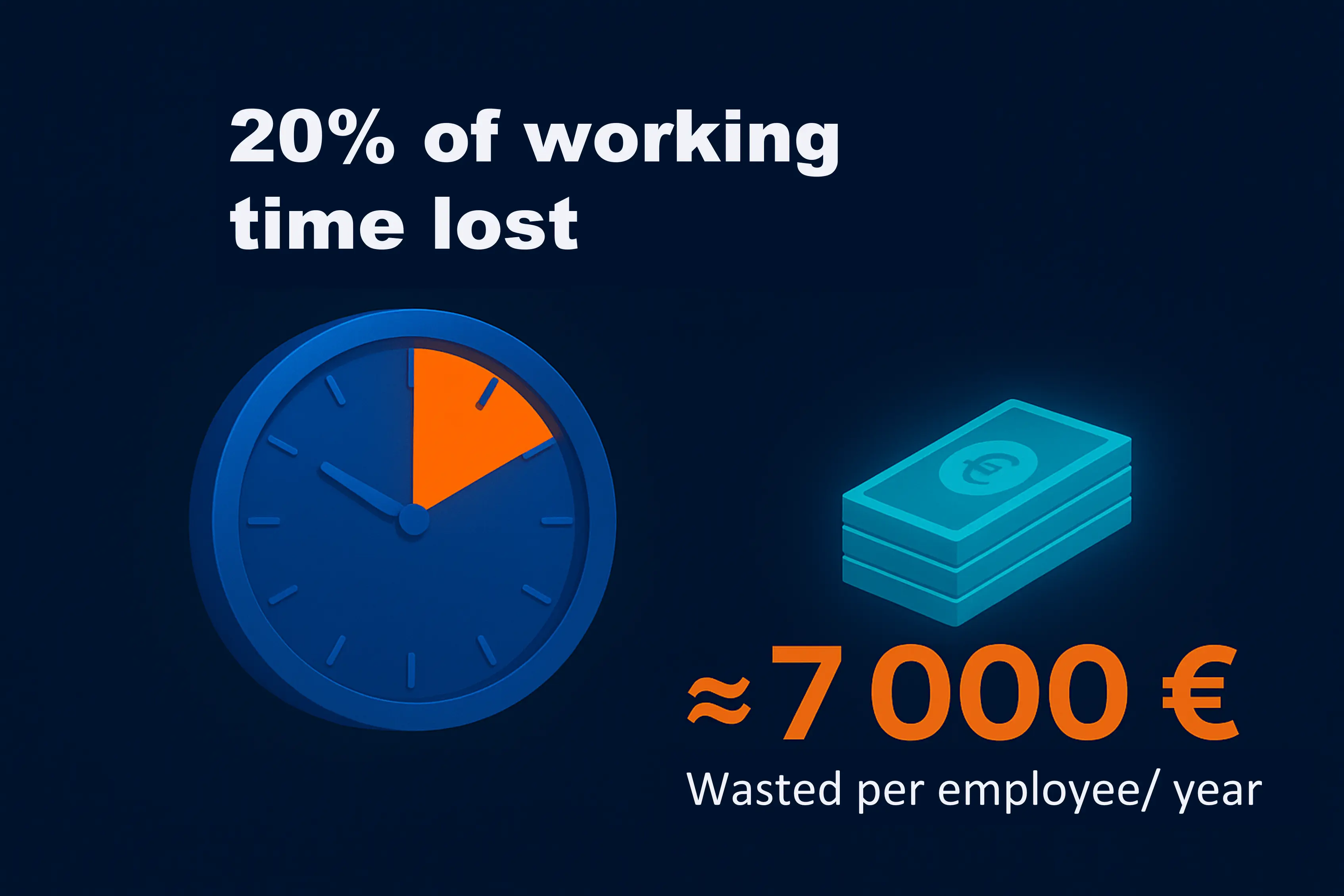
Partial, risky decisions
Without centralized data, management makes decisions based on incomplete or outdated information. Projects can go off track without anyone noticing.
Duplicates and inefficiency
Employees often enter the same information multiple times, causing errors and wasting time. Each duplicate entry can cost the equivalent of one workday per week, per employee 💸
Stress & Turnover
Employees juggling 10–12 different applications experience constant cognitive overload, leading to demotivation and talent loss.

Missed opportunities
Delayed responses to clients, ignored business insights, or postponed projects result in lost revenue. Depending on the sector, this can range from €10,000 to €20,000 per year for an average SME 💸
➡️ What if, instead of enduring these invisible losses, you could turn every minute into added value?
Elix : The Management Platform Designed for Modern SMEs
What are Elix Capabilities?
While many integrated management solutions impose rigid frameworks, Elix stands out for its modularity and simplicity. Each business can tailor its workspace according to its needs:
➡️Versatility
Elix = A single platform that covers the core daily operations of an SME, eliminating the need for multiple software tools.
➡️Modularity
Ticketing, Project management, HR, finance, reporting, Quality Assurance (QA), document management (EDM)… Elix forms an ecosystem where each module can be deployed according to the company’s growth and priorities.
➡️Scalability
Thanks to its Low-code Builder, Elix doesn’t just adapt existing modules, it enables the creation of custom workflows and even bespoke business applications perfectly aligned with internal processes.
➡️Intelligent Collaboration
Elix helps centralize communications (comments, chat), track progress in real time (notifications, company updates), and maintain full traceability (custom dashboards & KPIs).
➡️Security & Traceability
Elix ensures security through ISO 27001 compliance, granular user permissions, full action and document history, access controls, and protection of sensitive data ensure confidentiality and information integrity.
➡️Contextual AI Integration
Elix AI acts as a transversal assistant, streamlining decision-making and freeing up time for high-value activities (automating repetitive tasks, creating & prioritizing tasks, generating reports, risk analysis, etc.).
How Elix Transforms Daily Life in SMEs
🕣 8:30 AM – Marc opens Elix. At a glance, his personalized dashboard shows today’s updates: project progress, employee timesheets, estimated expenses and revenue, and more. No need to juggle multiple software tools or dig through emails.
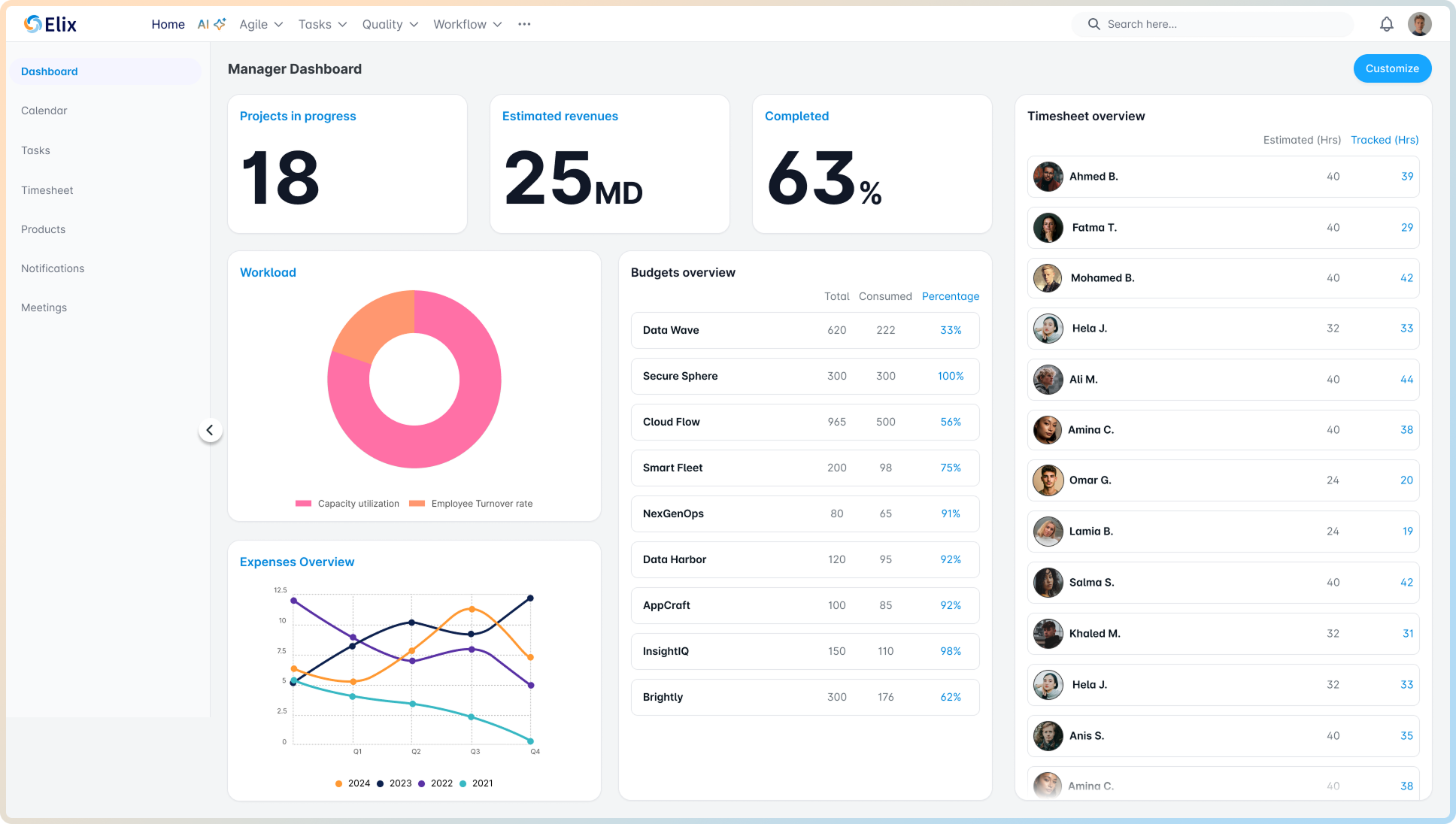
🕘 9:00 AM – To finalize a strategic quote, Marc relies directly on Elix. All necessary documents—client requirements, financial data, commercial terms—are already centralized and synchronized. With just a few clicks, he sends a coherent version to the client.

🕥 10:30 AM – Project meeting. The entire team joins the same shared space in Elix: tasks, responsibilities, documents, and planning. Progress is updated live and automatically integrated into project tracking (% completed, blockers, etc.)
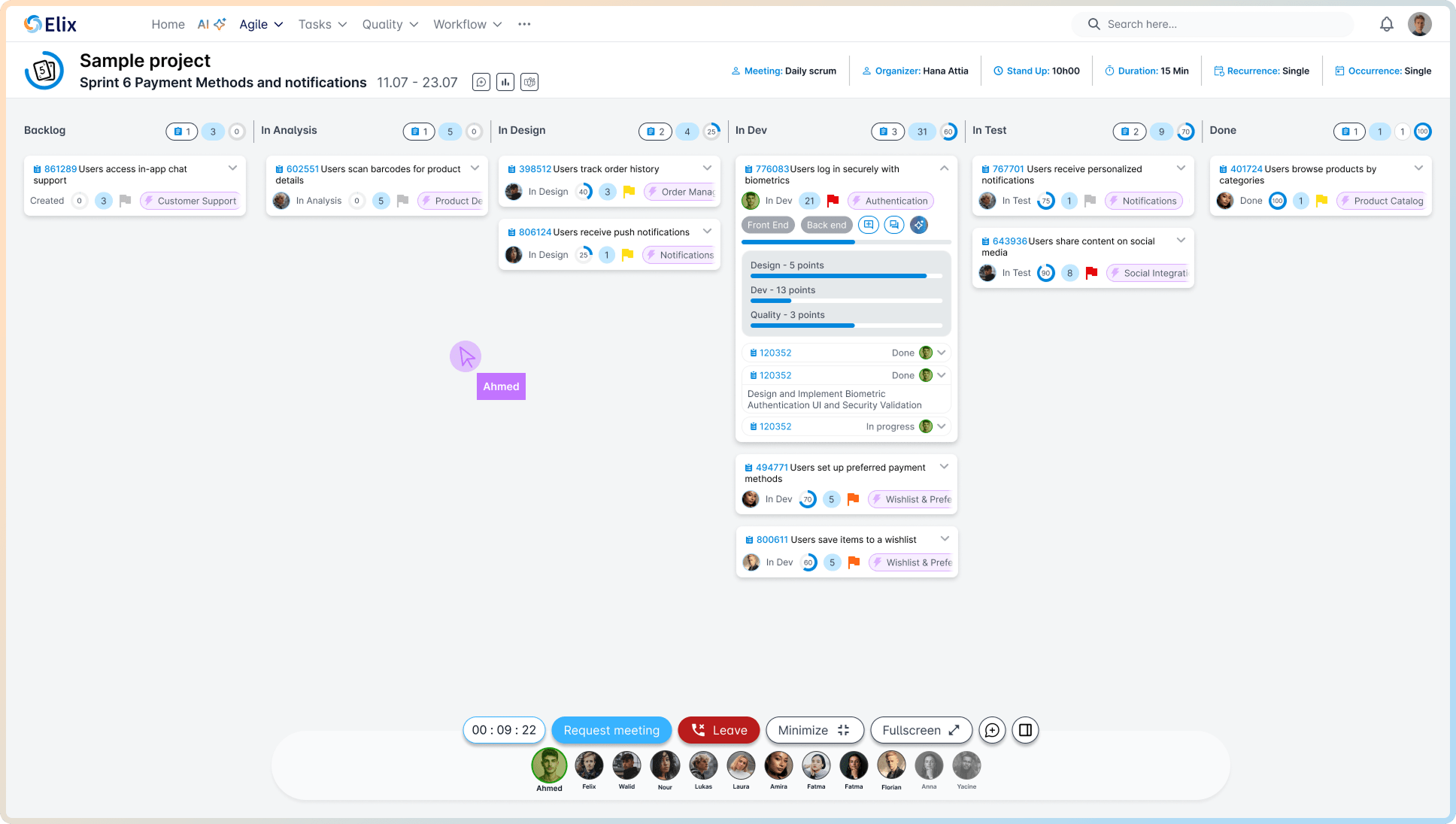
🕐 1:00 PM – A client calls to request an update on the budget spent. Marc opens the Agile module in Elix and instantly shares an updated view. The client receives real-time information, without going through multiple intermediaries.
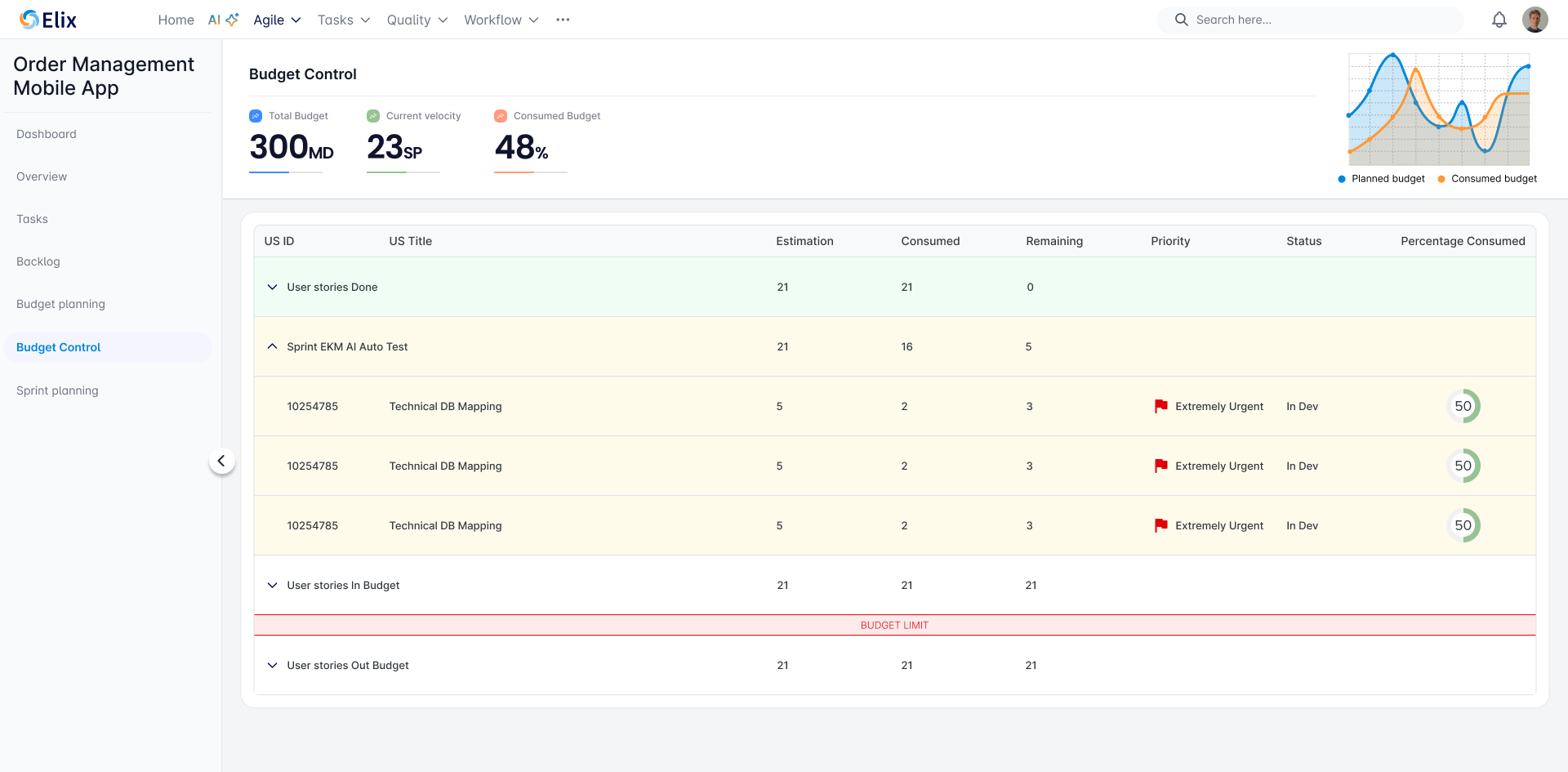
🕓 4:00 PM – Instead of losing time on administrative tasks, Marc focuses on strategy: preparing quotes, analyzing margins, and planning sales. Thanks to Elix, repetitive tasks are automated, data is centralized and reliable.
➡️ Result : Marc’s day is no longer a race against the clock but a clear, controlled workflow. With Elix, he regains control of his time, motivates his team, and finally dedicates his energy to growing his business.
Take Full Control of Your SME
Managing an SME with scattered tools is costly: lost time, errors, duplicates, and missed opportunities can significantly hinder growth.
With an integrated platform like Elix, these frictions disappear: information is centralized, processes are automated, and priorities are organized by AI.
➡️A 30-employee SME can recover up to €200,000 per year in productivity.
Content
Unlock Hidden Productivity & Take Control of Your SME now!
How Data-Driven Decision-Making Fuels Business Growth
Blog
·
18/07/2025
·
Are you navigating your company with Clarity or Guesswork?
Imagine steering a ship through fog without a compass. That’s what running a business without data is like. In today’s fast-moving, hyper-connected world, companies can no longer rely on instinct alone. They need clarity, precision, and confidence. That’s where data-driven decision-making comes in.
Instead of guessing what customers want or hoping that a campaign will succeed, businesses today are turning to data (real numbers, patterns, and insights) to guide their moves. This approach is no longer reserved for tech giants; it’s the new standard for any organization that wants to grow and stay competitive.
What does it really mean to be Data-Driven?
At its core, data-driven decision-making means steering your business with facts, not guesswork. Think of it like having a GPS for your company—not a static paper map or outdated instructions, but a live, intelligent system that continuously updates your location, alerts you to traffic jams, and reroutes you around roadblocks. It guides you with precision, adapting instantly to new conditions and opportunities.
Becoming data-driven starts by gathering diverse information such as:
- Sales figures
- Customer behavior
- Website traffic
- Employee performance
- Financial reports
Data collection alone isn’t enough; the power lies in analyzing data and turning insights into action. Key steps include:
- Collecting and integrating data across departments to avoid silos
- Ensuring data quality and governance for accuracy and reliability
- Using analytics tools to understand what happened, why, and predict what’s next
- Fostering a data culture where everyone asks questions, challenges assumptions, and makes evidence-based decisions
Together, these create a dashboard of vital signs—warning lights, speedometers, and fuel gauges—that keep your business healthy and moving forward.
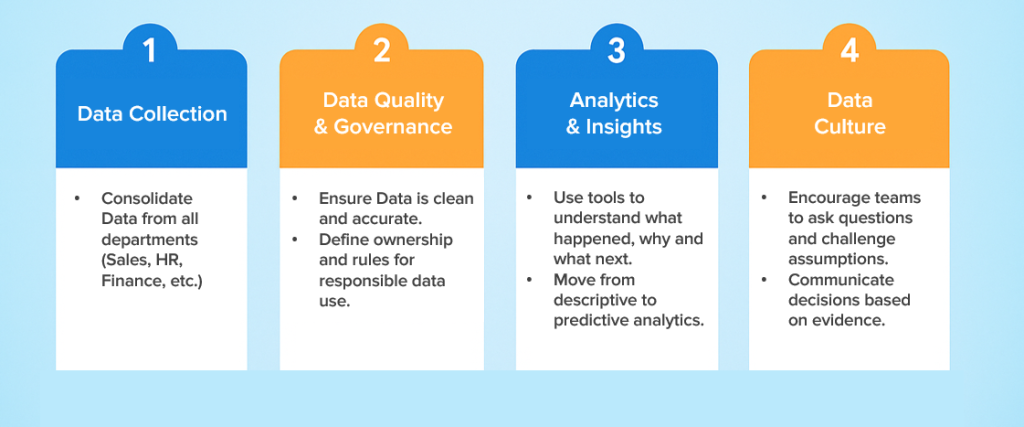
Why do Smart Businesses choose Data Over Intuition?
Reason 1 : Efficiency
With the right data, businesses identify bottlenecks and cut waste. Imagine a restaurant that tracks customer wait times and streamlines kitchen operations accordingly.
Reason 2 : Revenue Growth
Data reveals exactly which products are selling, who’s buying them, and when—helping you spot trends, understand customer preferences, and adjust your marketing and pricing to maximize revenue.
Reason 3 : Customer Satisfaction
Understanding what customers want before they even say it is a game-changer. Data helps personalize experiences, solve problems faster, and build loyalty.
Reason 4 : Competitive Edge
In a crowded market, it sees the whole field before anyone else. Data reveals shifts in customer behavior or market gaps that others miss.
Reason 5 : Risk Mitigation
Think of data as a radar system. It helps spot threats before they hit—whether it’s a dip in performance or a rising cost.
How does Elix help you see what matters?
As data volumes multiply, interpreting and acting on them becomes challenging. This growing complexity creates a clear need for tools that help make data accessible, understandable, and actionable across the organization.
This is where Elix comes in as a modern, modular platform designed to turn data into direction.
Elix is like the central nervous system of your organization. It connects all your internal “organs” (finance, operations, HR, sales, customer service) and lets them communicate through real-time data. The result? A business that thinks and reacts in sync.
Whether you’re running a small team or managing enterprise-wide operations, Elix empowers you with clear dashboards, automated workflows, and integrated KPIs, all tailored to your needs.
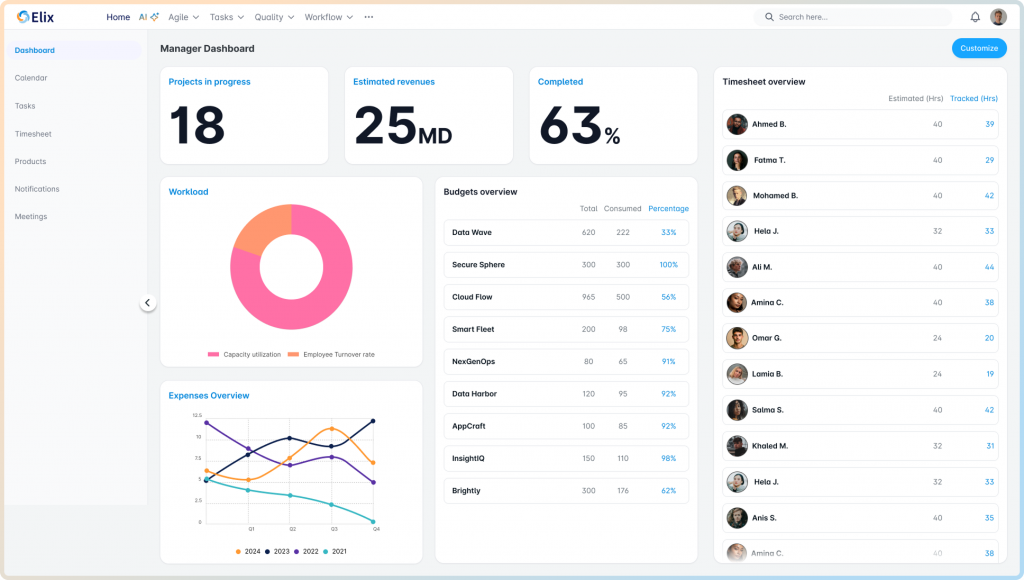
1. Elix helps keeping an eye on your most vital Metrics
Key Performance Indicators (KPIs) are the vital signs of a business. Elix monitors them continuously (eg. sales per product, conversion rates, project progress, customer support response times, and more.)
2. Elix makes your Data visible and actionable
With Elix dashboards, you have visual, real-time instruments that help you spot trends, zoom into problem areas, and share insights with your team.
From daily operational dashboards for front-line managers to high-level strategic overviews for executives, Elixadapts to every level of the organization.
- Example: An HR manager notices a spike in sick days among a specific team. Elix flags the trend before it spreads, prompting a check-in with the team lead and a shift in workload.
- Example: A customer success team sees a drop in feature usage from long-term clients. Elix spots the change and notifies the team, allowing proactive outreach before contracts are up for renewal.
- Example: A finance director observes that supplier costs have crept up over the last two quarters. Elix’s trendline visual brings it to light, triggering renegotiations before budget overruns escalate.
- Example: A retail manager notices that one store’s daily sales numbers are strong, but customer satisfaction scores are consistently low. Elix connects the dots, uncovering staff shortages during peak hours.
- Example: A product manager sees that users are frequently abandoning the onboarding process at the same step. Elix highlights the drop-off point, prompting a UX fix that boosts completion rates.
- Example: A CEO receives a dashboard alert showing that operational costs are rising faster than revenue in one business unit. Elix breaks down the root causes, revealing outdated processes that need automating.
- Example: A support lead sees a rise in reopened tickets related to the same issue. Elix automatically clusters these tickets, enabling a quick documentation update and a fix from the product team.
- Example: A sales director sees a high-performing rep’s conversion rate suddenly dip. Elix surfaces this anomaly early, helping the manager uncover a change in lead quality that needs marketing’s attention.
- Example: A logistics manager spots delivery delays in one region. The dashboard highlights it before it affects customer satisfaction scores.
3. Elix turns Insights into Real Business Benefits
Data only becomes valuable when it translates into smarter decisions, and that’s exactly where Elix shines. By combining real-time tracking, visual dashboards, and predictive insights, Elix doesn’t just show you what’s happening. It helps you do something about it.
Let’s break that down with some everyday business scenarios:
Boost Efficiency: Saving hours, reducing friction
No more wasting hours building reports from spreadsheets.
Example: A project manager once spent half a day compiling updates. Now, Elix auto-feeds data into a live dashboard, flagging blockers instantly and enabling rapid action.
➡️ Benefit: Elix automates reporting, centralizes data, and frees time for decision-making—not data wrangling.
Optimize Revenue: Know What Works
Track performance by product, service, or feature in real time.
Example: A SaaS company identified low conversions in a premium plan due to onboarding drop-off. After tweaking the flow, signups rose by 18% in one month.
➡️ Benefit: Elix helps you pinpoint issues and improve offerings, fast.
Customer Satisfaction: Spotting Trouble early
Don’t wait for negative reviews—anticipate them.
Example: Elix revealed slower ticket resolution in one region. The team responded immediately, adjusted staffing, and saw satisfaction scores rebound.
➡️ Benefit: Elix detects early signals so you can protect customer loyalty.
Let Elix take the wheel !
Data-driven decision-making isn’t a trend, it’s a survival skill. Businesses that harness data can see more clearly, act more quickly, and grow more sustainably.
With a platform like Elix, the process becomes seamless. It’s not just about having data; it’s about having the right data, at the right time, in the right hands. Elix turns complex information into simple, actionable insight—like turning headlights on before a long drive at night.
Content
Ready to turn your data into impact and actions?
Why Customizability matters in choosing your Business Software?
Blog
·
11/07/2025
·
Let’s face it : running a business today isn’t what it used to be. Everything moves fast: customer expectations, market demands, and internal operations. To keep up, companies need software tools that are just as agile.
But here’s the reality : even companies in the same industry rarely work the same way. Each has its own structure, workflows, strengths, and culture. What fits one perfectly may feel completely off for another. So why should they all use the same software in the same way?
Think of it like setting up a computer system. Sure, the hardware might be similar, but the software setup—preferred apps, shortcuts, automations, even the folder structure—varies wildly based on how each user works. A rigid, one-size-fits-all setup slows you down. A tailored system boosts productivity.
That’s why customizability in business software has become such a game-changer. It’s no longer just about ticking boxes on a feature list, it’s about finding software that bends and grows with your business. Especially for Small and Medium-sized Enterprises (SMEs) : having the freedom to tweak and tailor tools to fit your unique processes can make all the difference.
What does “Customizable Business Software” really Mean?
When we talk about customizable software, we mean software that you can adapt to your business, without having to rebuild everything from scratch or rely on outside developers for every little change.
There are 3 core pillars of customization in modern platforms : Configuration, Extension and Integration.
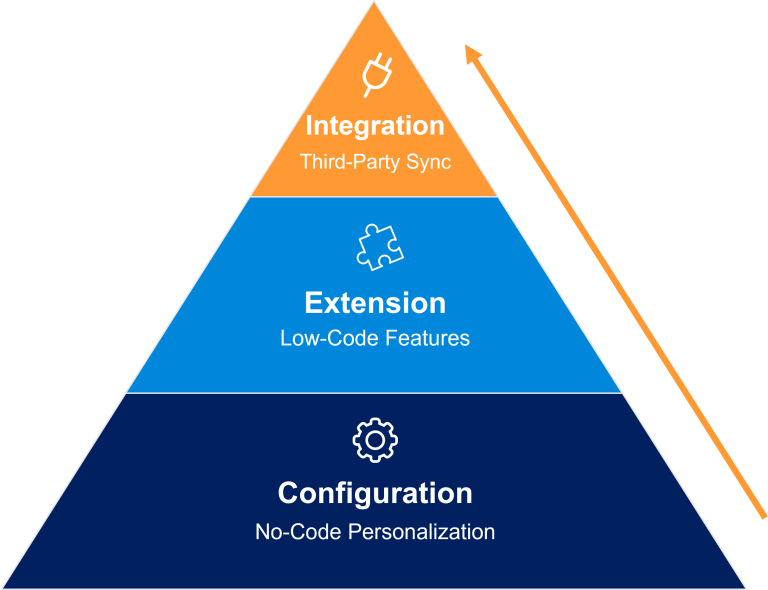
1. Configuration (No-Code)
This is the simplest level. Think of it as personalizing settings inside the app. You can change workflows, add new fields, adjust user roles, or customize dashboards, all without touching any code.
2. Extension (Low-Code)
Sometimes you need more than tweaks. With extension capabilities, you can build new features, add logic, or develop micro-apps to match how your business operates. Usually this involves low-code tools, but it’s still way faster and easier than traditional development.
3. Integration (Connected tools)
No software exists in a vacuum. Customizable software should connect easily with your other tools—like CRMs, ERPs, email platforms, or databases, so everything works together smoothly.
When these three levels work well together, they give you the power to shape your software around your business, not the other way around.
Why is software customizability Important for SMEs ?
For small and medium-sized enterprises (SMEs), adaptability isn’t just nice to have, it’s essential. These businesses often face constant change: shifting market demands, new customer expectations, evolving internal processes, or sudden growth… and it all happens fast.
And when your software can’t keep up? That’s when things start to break down. That’s why software needs to work with them, not against them.
1. Workarounds become the norm
When software can’t be adjusted to fit how your business operates, teams are forced to find their own ways around it, manual processes, spreadsheets, or patching things together with copy-paste. These workarounds waste time, introduce errors, and reduce overall productivity.
2. Every small change becomes a big cost
Need to tweak a workflow or add a new feature? Inflexible systems often require vendor support or third-party developers, which means added expenses and long delays for even simple updates.
3. It blocks business growth
As your business evolves (offering new services, expanding into new markets, or growing your team), your software needs to keep up. Rigid tools can’t scale with you. They slow you down just when you need to move faster.
4. Decision-making becomes harder
Inflexible software rarely gives you the exact data you need, in the format you need it. Without customizable dashboards or reports, your team spends more time collecting data than acting on it.
Elix : A Business Software that adapts to you
This is where Elix comes in, as a modern business solution built with adaptability at its core.
A Modular Ecosystem of Micro-Apps
At its core, Elix is an ecosystem of micro-apps, each focused on a specific function, like Project Management, Tickets, HR, or internal operations. These apps are designed to work together seamlessly, sharing data and context in real time to support every layer of your business.
Think of it like your own company: different departments handle different responsibilities, but they all need to communicate and coordinate to get things done. Or even better, like the organs in a human body. Each one has its own role, but they’re interconnected, constantly exchanging information to keep everything running smoothly. That’s how Elix works. Every micro-app plays its part, but together, they create a single, well-aligned system that supports the health and growth of your entire business.
The Low-Code Builder at its Core
At the heart of it all is Elix’s Low-Code Builder. This powerful yet simple tool allows you to customize workflows, forms, data structures, and even interfaces, without needing a technical background.
Whether you’re building a custom sales pipeline, automating internal approvals, or tracking performance across departments, Elix gives you the freedom to shape it all, your way.
What makes Elix a good fit for SMEs?
1. Drag-and-Drop Builder
No code? No problem. Elix’s low-code interface lets you design forms, processes, and automations visually. It’s as simple as building with blocks.
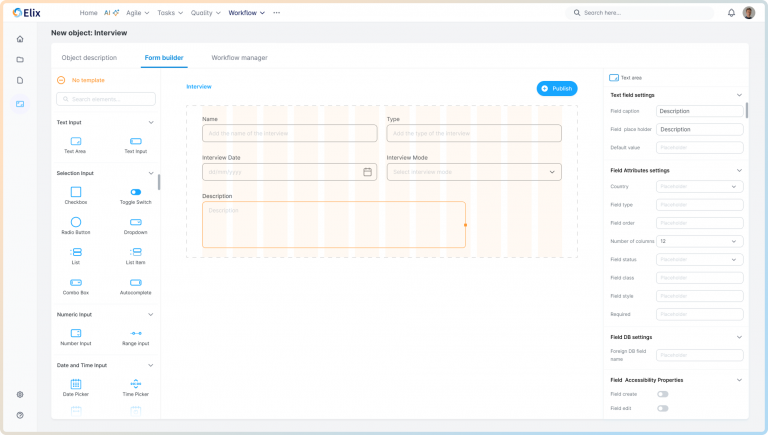
2. Modular by Design
Add features when you need them, remove ones you don’t. Elix scales with you, so you’re never stuck paying for things you don’t use.
3. Seamless integrations
Easily connect to your internal tools : CRM, GitLab, Jenkins, invoicing systems, Google Sheets, APIs, and more. Your tech stack stays connected and efficient.
4. Smart permissions
Define who sees what, and control access with precision. Perfect for teams with multiple roles and responsibilities.
5. Custom Dashboards
Everyone can see what matters to them, sales teams track deals, Ops teams monitor tasks, and managers get the big picture in real time.
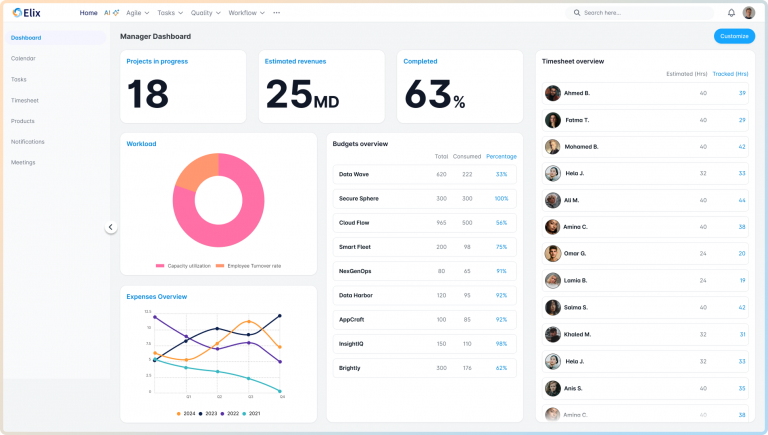
How Businesses are using Elix
Elix is already helping businesses across a wide range of industries. Here are just a few examples:
- A logistics company built a custom delivery tracking system with automatic client notifications, route management, and invoicing—no external help needed.
- A real estate agency uses Elix to track property listings, client interactions, and legal documentation—all in one place.
- A manufacturing company manages production orders, inventory, and supplier coordination using integrated micro-apps.
- A marketing agency customizes project pipelines, client dashboards, and content approval workflows.
- A healthcare provider digitizes patient intake, staff scheduling, and internal ticketing with full control over permissions and data privacy.
- A freelancer collective uses Elix to track contracts, invoices, and collaborative tasks—tailored to how each partner works
Wrapping Up : Why Customizability Should Be a Dealbreaker
The truth is, no two businesses are exactly alike. Elix reflects that.
Rigid, out-of-the-box tools may help you start, but they rarely help you grow. Customizable platforms like Elix support your team, streamline your operations, and scale alongside your vision.
With its low-code builder, interconnected micro-apps, and personalized views for every team, it’s not just another software, it’s a platform that flexes around your business, not the other way around.
So, when you’re choosing your next business software, don’t just ask, “What can this tool do?” Ask, “How easily can it grow with me?”
Content
Looking for a Business Software that adapts to you, not the other way around?
The future of ERP is Modular : How Elix empowers Organizations
Blog
·
04/07/2025
·
In an age where agility, modularity, and user-centric interface are non-negotiable, organizations -across both private and public sectors- are moving away from one-size-fits-all ERP systems, seeking platforms that enable faster iteration, decentralized collaboration, and scalable growth.
This is where Elix comes in : a next-generation, modular Business Management Suite designed to meet the evolving needs of modern organizations.
Why businesses need modular, Agile systems
While traditional enterprise systems have provided structure for decades, they often lack the agility needed to support modern workflows. Today, teams need tools that evolve with them, not systems that slow them down.
According to McKinsey, over 70% of digital transformation projects fail, often due to rigid legacy systems, among other factors.
Today, many organizations and companies face common limitations :
- Costly, time-consuming implementations and deployments
- Rigid architectures that resist customization
- Limited scalability across departments and functions
- Fragmented tools that isolate data, documents and workflows
To stay competitive, organizations now require platforms that are modular, lightweight, and easy to adapt, without compromising on functionality or security.
Elix: The modular “ERP alternative”
Designed from the ground up to support dynamic operations, Elix is a smart and scalable Business & Project Management platform that lets you choose exactly the features you need, when you need them.
No unnecessary features, no delays, no legacy complexity.
1. Built on modularity
Elix consists of independent micro-applications (modules) that can be added or removed based on your organization’s unique needs. From project management and HR to IT and QA Management, every module is seamlessly integrated but independently operable.
➡️Benefit : Pay only for features you need. Scale as you grow.
The graphic below illustrates how Elix supports gradual scaling and sustainable digital adoption, compared to traditional systems with high initial costs :
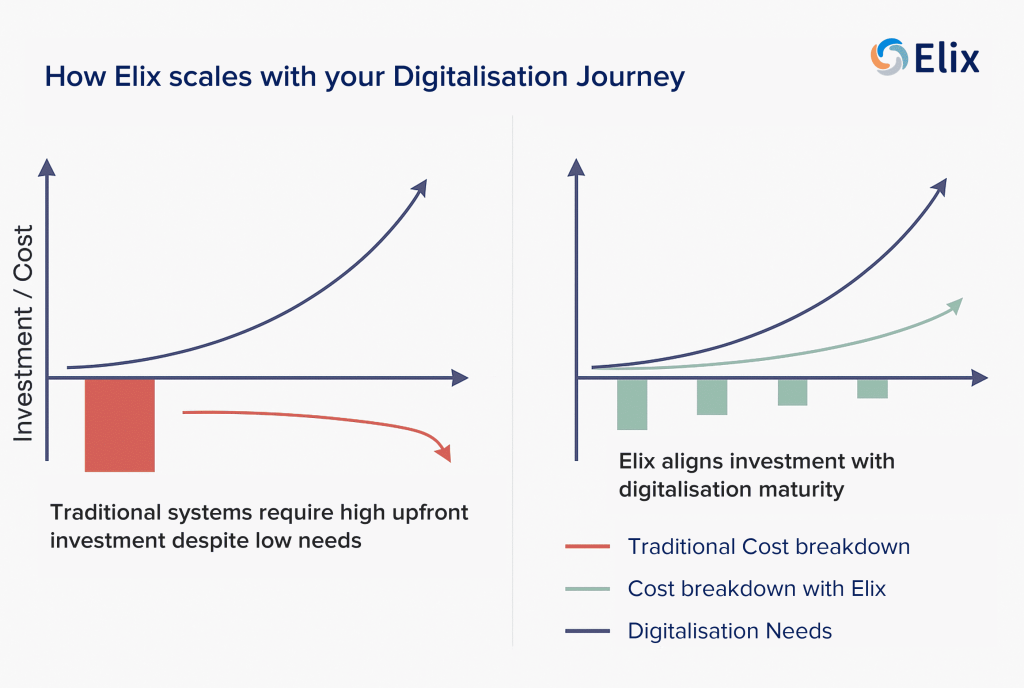
2. Optimized for Agile teams
Elix offers built-in tools for ticketing, Backlog management, sprint planning, budget control and real-time collaboration. It’s built for agile frameworks like Scrum, Kanban, or hybrid models, so your teams can work the way they want.
➡️Benefit : Boost team performance, accelerate project delivery and adapt quickly to changing priorities.
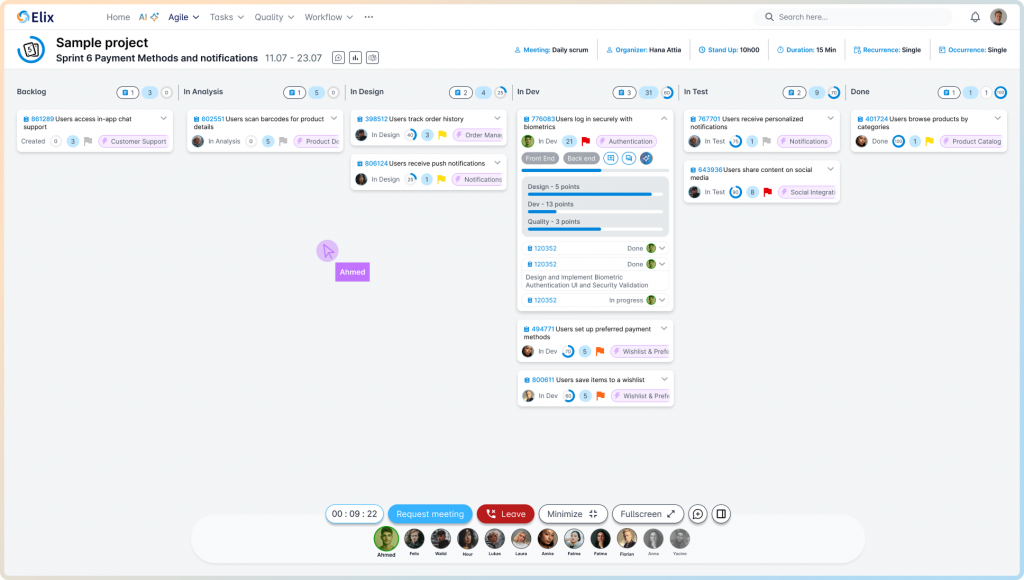
3. Integrated Office Management
Elix goes beyond traditional ERP functionality by incorporating everyday office essentials into its core. Manage documents with version control, maintain a centralized knowledge base, publish internal updates/news, and create a fully customizable Wiki, all from one place.
➡️Benefit : Streamline internal communication, reduce administrative overhead and keep your teams & departments aligned.
What makes Elix the right fit for Modern Organizations
Architecture : Microservices, microfrontends
Average setup time : 2-3 days
Flexibility : High
Pricing model : Module-based, scalable
Interfaces : Modern & intuitive
Ideal for : Companies/ institutions of all sizes
User adoption rate : > 80% in the first month
Customization time : Hours to days
The future of ERP is modular, Agile, and Human-centered
Forward-thinking CTOs, CEOs and decision-makers are realizing that success depends on systems that are built for change, not built to resist it.
Elix isn’t a traditional ERP, and that’s exactly the point. It’s a modular, flexible platform built for organizations that need to move fast, scale efficiently, and empower every team without the technical overhead.
In short : Elix delivers the tools you need, without the complexity you don’t.
Content
If you're currently juggling disconnected systems
or
exploring ERP alternatives ..